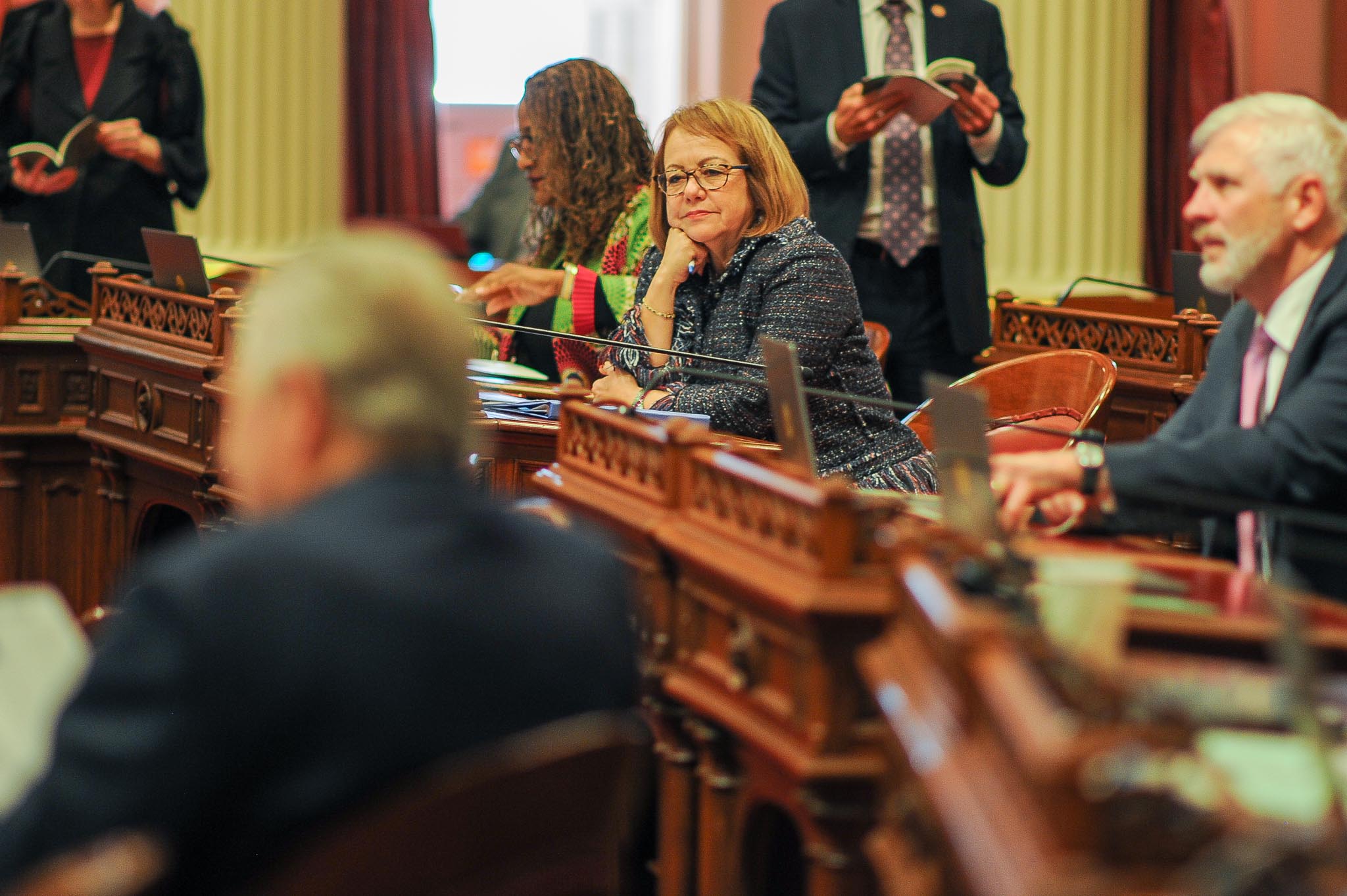
Sen. Maria Elena Durazo. (Photo: Kevin Sanders for California Globe)
SB 62 Expands Liability on Garment Manufacturers
Legislation: California’s garment industry is ‘rife with violations’ of labor and health and safety standards, ‘vicious price competition’
By Chris Micheli, September 27, 2021 4:36 pm
On September 27, 2021, Governor Gavin Newsom signed into law Senate Bill 62 by Sen. Maria Elena Durazo (D-Los Angeles), which will increase legal liability on garment manufacturers in California, as well as eliminate the piece-rate method of payment for garment workers.
Section One of the bill makes ten legislative findings and declarations including that California’s garment industry is “rife with violations” of labor and health and safety standards. “Vicious price competition” has resulted in garment workers being paid an average of $5.15 per hour. Despite a 1999 law, some retailers and manufacturers have tried to circumvent the anti-wage theft law to avoid liability for stolen wages. And, “upstream liability” must be established in order to address wage theft.
In addition, the Legislature finds and declares that unsafe working conditions are created due to garment workers being paid on a piece-rate basis. “Workers paid by a piece rate lose income when they take breaks.” Moreover, a “majority of workers are undocumented and ineligible for unemployment benefits or federal stimulus aid.” And, “the fashion brands …. Are complicit in the exposure of workers to coronavirus infection and the violation of workers’ wage rights.”
Section Two of the bill amends Labor Code Section 2670, part of the 1999 anti-wage theft statute. SB 62 adds several legislative intent statements. First, it is the intent of the Legislature to “restore the purpose of AB 633 (1999) to prevent wage theft against garment workers by clarifying ambiguities in the original language.” Several manufacturers of garments have tried to avoid liability as a guarantor by “adding layers of contracting between themselves and the employees manufacturing the garments.”
As a result, this bill is intended to revise existing law to “make clear that a person contracting to have garments made is liable for unpaid wages, damages, penalties, and other compensation owed to workers who manufacture those garments regardless of how many layers of contracting that person may use.” Finally, it states that nothing in this bill prohibits a local municipality from enacting its own, additional, protections for garment industry workers.
Section Three of the bill amends Labor Code Section 2671 to define the term “garment manufacturer” to mean any person who is engaged in garment manufacturing who is not a contractor. It would provide an expanded definition of the process of “garment manufacturing.” The bill creates the definition of “brand guarantor” to mean any person contracting for the performance of garment manufacturing.
Contracts for the performance of garment manufacturing include licensing of a brand or name, regardless of whether the person with whom they contract performs the manufacturing operations or hires contractors or subcontractors to perform the manufacturing operation. Finally, the term “contractor” would be expanded to include “altering a garment’s design, causing another person to alter a garment’s design, or affixing a label on a garment.”
Section Four of the bill amends Labor Code Section 2673 to require garment manufacturers to keep accurate records for four years (instead of the current three years) with specified information. The bill also requires record retention for four years of all contracts, invoices, purchase orders, job orders, etc., as well as a copy of the garment license of every person engaged in garment manufacturing. In addition, brand guarantors would also have to keep accurate records for four years that include specified documentation.
Section Five of the bill amends Labor Code Section 2673.1 to specify that either a garment manufacturer or a brand guarantor is jointly and severally liable with any manufacturer or contractor who perform operations for a garment manufacturer or brand guarantor for:
- The full amount of unpaid wages, expense reimbursements, and any other compensation, damages, and penalties for any employee who perform manufacturing operations;
- Liquidated damages owed to any employee who perform manufacturing operations;
- The employee’s reasonably attorney’s fees and costs; and
- Civil penalties for failure to secure valid workers’ compensation coverage.
Section Five of the bill amends Labor Code Section 2673.1 to eliminate the current liability limitation to the proportionate share of two or more persons, and replace it with language that, for those parties held jointly and severally liable, the parties can establish by contract or otherwise any lawful or equitable remedies such as contribution or indemnity. Employees may enforce this section solely by filing a claim with the Labor Commissioner.
This bill also amends Section 2673.1 to specify that, if an employee provides the Labor Commissioner with labels from a brand guarantor or garment manufacturer or other credible information about their identity, there is a presumption that the brand guarantor or garment manufacturer is liable with the contractor for any amount found to be due to the employee.
Employee claims about compensation are presumed valid unless the brand guarantor or garment manufacturer or contractor provides “specific, compelling, and reliable written evidence to the contrary.” Also, a written declaration or testimony is not sufficient to rebut the presumption of validity of the workers’ claim and liability of the respective parties.
This bill additionally eliminates the provisions that limit the contractor’s share of the attorney’s fees and costs awarded to an employee only if the Labor Commissioner determines that the guarantor acted in bad faith. If a contractor, garment manufacturer, or brand guarantor appeals, they are required to post a bond with the Labor Commissioner in an amount equal to one and half times the amount of the award. However, no bond is required of an employee filing an appeal. And, an employee can request to be represented by the Labor Commissioner in any judicial proceeding.
The bill expands existing law to allow the Labor Commissioner to enforce the joint and several liability of a garment manufacturer or brand guarantor in the same manner as a proceeding against the contractor. In addition, existing law is expanded to allow the Labor Commissioner to enforce this law by issuing stop orders or citations. Any statutory damages or penalties recovered are payable to the employee.
Section Six of the bill adds Labor Code Section 2673.2 to ensure that employees are paid for all their hours worked and not be paid by the piece or unit, or by a piece rate. Nonetheless, incentive-based bonuses are not prohibited. Also, this prohibition does not exist where the workplace is covered by a collective bargaining agreement that covers wages and working conditions. Any garment manufacturer or contractor who violates this section is subject to statutory damages of $200 for each pay period in which the employee is paid by the piece rate.
This new section of law may only be enforced by filing a claim with the Labor Commissioner. The Labor Commissioner can also bring an action to enforce this section or issue a citation for a violation. And, any statutory damages or penalties recovered are to be paid to the employee.
Section Seven of the bill amends Labor Code Section 2675.5 to require $75 of each registrant’s annual registration fee to be placed into the Garment Manufacturers Special Account. Employees must assign to the Labor Commissioner all of the employee’s claims and judgment to be paid from this fund.
The Labor Commissioner determines whether a claim is accepted and the amount of money that is to be disbursed from the Garment Manufacturers Special Account on an accepted claim. The Labor Commissioner has the authority to investigate any claims and hold a hearing to determine the validity of a claim seeking recovery from the GMSA.
- Should Interpretive Guidance Be Included in California Legislation? - April 28, 2024
- Legislative Intent Does Not Equate to a Mandate - April 27, 2024
- Frequently Asked Questions about State Agency Ethics Training - April 26, 2024





Reason 4,783 not to have a business in Kalifornia or to even do business in this state. If you value your company stay out of the Deranged State.
Poor Comrades
You vote and vote for more pain/punishments…….you’re sick
What makes you think WE voted for these sub-humans running the state? Aim your fury and disdain at the interlopers who appointed themselves through election fraud. For years. Our votes and voices dissipate into thin air.
Brands are making enormous margins while a majority of garment workers are abused – SB 62 will help balance those inequalities